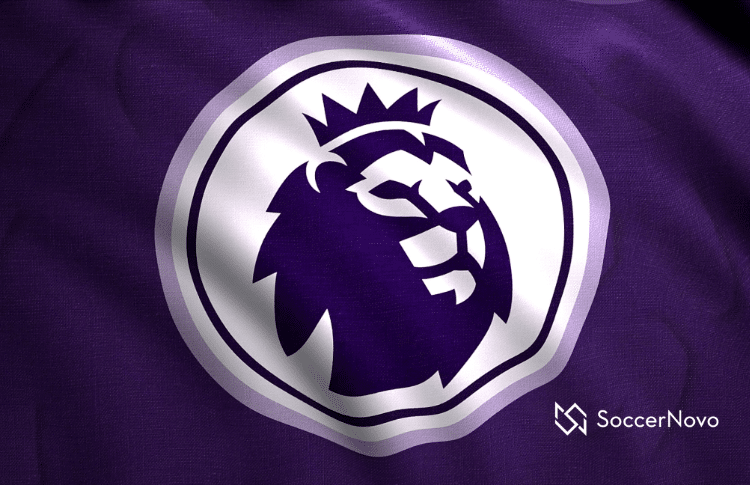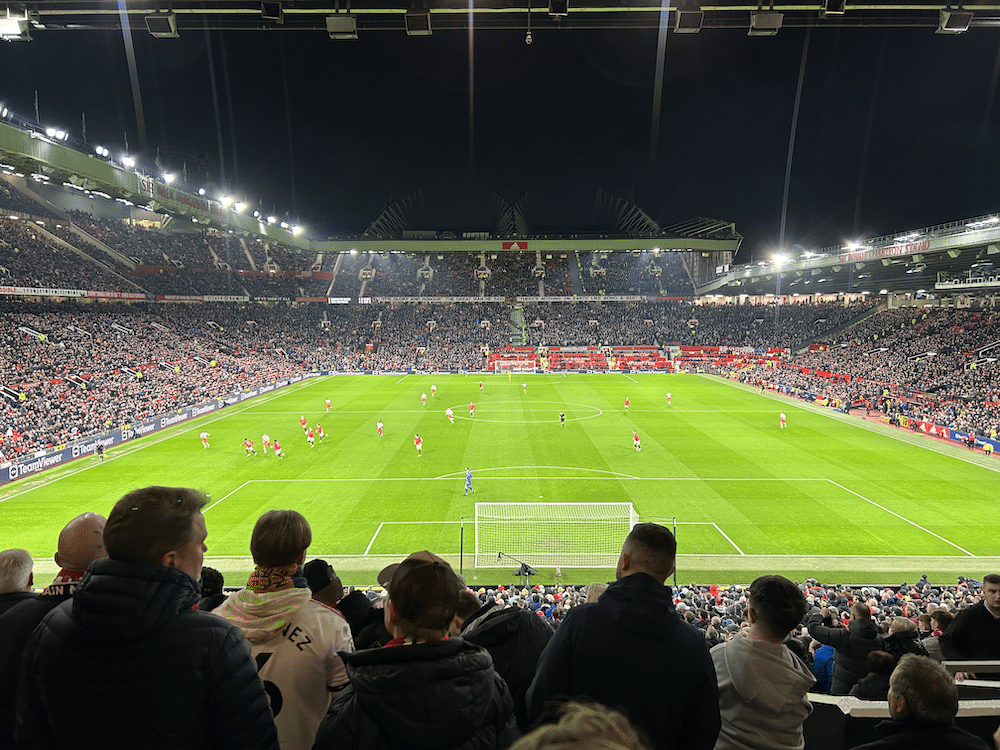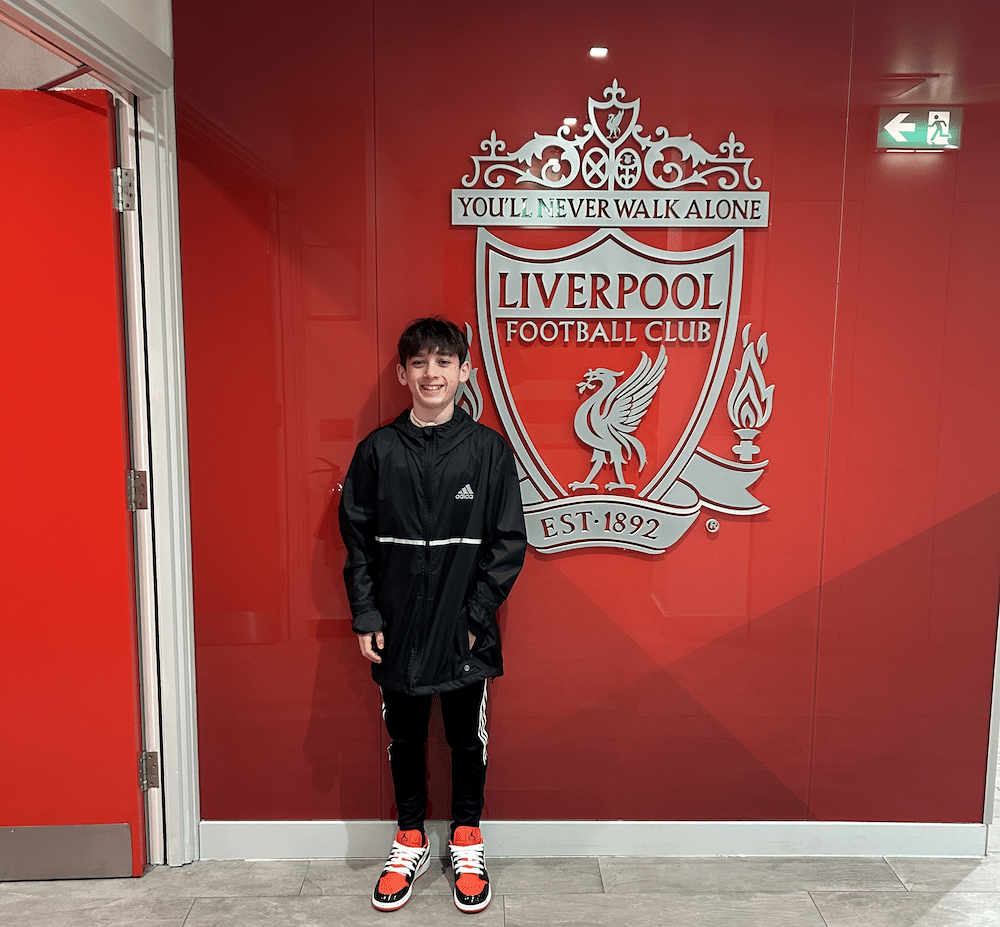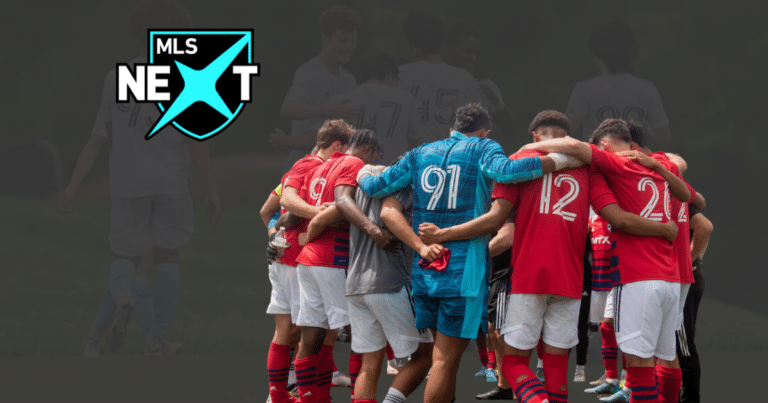Premier League: The Average American’s Guide

Are you new to the Premier League but have the desire to jump on the bandwagon? Maybe your friend is a Man U or Liverpool fan and you’re jealous you don’t have a team. Or, maybe you crave more soccer and the Premier League will satisfy that craving.
Whatever the case may be, the Premier League is exciting, electric, and thrilling. It can also be disappointing at the same time. I think the mix of emotions coupled with the level of play makes this league very fun to follow.
In this article, I’ll spew everything you will want to know about the most popular professional soccer league in the world!
History of Premier League
The Premier League was formed in 1992, following a decision by the First Division clubs to break away from the coveted Football League. The league currently comprises of 20 clubs, who play each other twice during the course of a season, once at home and once away.

The origins of the Premier League can be traced back to the early 1990s, when English First Division clubs believed that a radical restructuring of football was needed if they and the game, in general, were to develop and flourish. On 17 July 1991, they signed the Founder Members Agreement, establishing the basic principles for the setting up of the Premier League.
The first Premier League season began on August 15, 1992, with 22 clubs competing for the title. The inaugural champions were Manchester United, who finished 10 points clear of Aston Villa.
Over the years, the Premier League has become one of the most popular and lucrative football leagues in the world. It is broadcast in over 200 countries, with an estimated global audience of over 4 billion!
The league’s success has been driven by a combination of factors, including its competitive nature, high-quality football, and the financial rewards on offer.
Premier League Structure
In this section, we will take a closer look at the Premier League’s structure, including the teams that compete, the season format, and the promotion and relegation system.
Teams
The Premier League is made up of 20 teams, with each team playing 38 matches over the course of a season.
The teams are selected based on their performance in the previous season, with the top 17 teams automatically qualifying for the Premier League.
The teams that finish in 18th, 19th, and 20th place are relegated to the Championship, the second tier of English football.
Season Format
The Premier League season typically runs from summer to spring, with each team playing 38 matches against all other teams, both home and away. Yes, that’s a long season!
The team with the most points at the end of the season is crowned the champions of the league. In the event of a tie, the winner is determined by goal difference, followed by goals scored.
Promotion and Relegation
This is the fun part of the league and I wish MLS would adopt something similar. The Premier League operates on a system of promotion and relegation with the English Football League (EFL). The teams that finish in the top four positions of the Premier League qualify for the UEFA Champions League, while the teams that finish in fifth and sixth place qualify for the UEFA Europa League.
At the end of the season, the three teams that finish in the bottom three positions of the Premier League are relegated to the Championship, while the top two teams in the Championship are promoted to the Premier League. The third promotion spot is determined by a playoff between the teams that finish in third, fourth, fifth, and sixth place in the Championship.
This system makes every game count especially those towards the middle and bottom of the table. On the flip side, it provides teams like Luton Town to compete against the ‘big boys’.
When Does the Premier League Season Start?
The Premier League season typically starts in mid-August and runs until mid-May of the following year. The exact start date can vary slightly from year to year, but it is typically announced several months in advance.
One thing to keep in mind is that the Premier League schedule can be subject to change. This can happen for a variety of reasons, such as weather-related issues or scheduling conflicts with other competitions.
If you’re planning to attend a Premier League match or watch one on TV, it’s always a good idea to double-check the schedule beforehand to make sure that nothing has changed.
When Are Premier League Games on TV in the U.S.?
As someone living in the States, you can catch most of the games on the weekends. Most of these matches are broadcast on NBC and its affiliated networks, such as NBC Sports Network and Telemundo.
Some matches are also available on streaming services like Peacock and NBC Sports Gold.
The exact schedule of Premier League matches on TV can vary depending on the season and the broadcaster. However, most matches take place on weekends, with a few midweek matches thrown in as well. Some matches are also shown in prime time, while others are broadcast earlier in the day.
We’re lucky that we get access to the games. During our trip to England, it was surprising to learn many games aren’t shown on regular TV. Fans are encouraged to attend the games live rather than watch them at home.
Does Premier League Have Playoffs?
No, the Premier League does not have playoffs to determine the champion.
The Premier League uses a round-robin format, where each team plays every other team twice, once at home and once away. The team with the most points at the end of the season is crowned the champion.
However, there is a playoff system in place for teams that finish third to sixth in the Champions League. The winner will get a bid to join the Premier League in the next season.
Their playoffs consist of two semi-finals, where the third-placed team plays the sixth-placed team, and the fourth-placed team plays the fifth-placed team. The winners of the semi-finals then play each other in a final at Wembley Stadium, and the winner is promoted to the Premier League!
Picking a Premier League Team to Follow
By now, you may be amped to watch some Premier Leagues but you’ll quickly learn that following a team makes it even more exciting.
It’s difficult to figure out which team to support. Do you support Man City who is kind of like the New York Yankees of soccer? Do you follow newcomers who might get relegated next season? It can be challenging to figure it out but let’s take the following into consideration.
Location

One of the most obvious factors to consider is location. Do you have a connection to a particular city or region in England? If so, that could be a good place to start.
Supporting a local team can be a great way to feel connected to the community and get involved in local events and traditions.
Additionally, if you have family ties, you can attend live matches if you have a chance to visit them!
Playing Style
Another factor to consider is playing style. Do you prefer a team that plays an attacking, high-scoring game, or one that focuses more on defense? Some teams are known for their fast-paced, exciting style of play, while others are more methodical and strategic.
History and Tradition
If you’re interested in the history and tradition of a team, you might want to consider one of the more established clubs, such as Manchester United, Liverpool, or Arsenal. These teams have a long and storied history in English football, with many memorable moments and legendary players.
Current Players
Of course, the current players on a team can also be a major factor in your decision. Do you have a favorite player who you want to follow? Or are you more interested in a team with a strong overall roster? Keep an eye on the transfer window to see which players are coming and going from each team.
Colors & Logos
Believe it or not, some fans choose their team by their team logos and/or colors. Does maroon make you vomit? You probably won’t want to cheer for West Ham. Don’t like seagulls? You’ll want to avoid Brighton & Hove Albion.
Personal Preference
Ultimately, the decision of which team to support is a personal one. You might feel drawn to a team for reasons that can’t be easily explained. Maybe you like their colors, or their mascot, or the way their fans sing and chant. Whatever the reason, don’t be afraid to follow your heart and choose the team that feels right to you.
How We Chose Newcastle
Tottenham Hot Spurs has been my son’s team for the longest time because Harry Kane was their Striker. My son’s name is Kane so he could rock the jersey. His choice was kind of by default. I simply followed suit.

Now that Harry Kane moved to Bayern Munich, we decided to find another team to follow. It goes to show you how dedicated we were!
Coming home from a scrimmage in August, we both decided that we needed a team. We didn’t want to follow popular teams like Man City, Manchester United, Liverpool, and Arsenal because it seemed like everyone around us was a fan of one of these teams. What fun is it to join them?
Instead, we looked at the teams and decided on Newcastle because they had some recent success but not too much, we know someone from there, and their colors/logo “spoke to us”. So, Newcastle it is!
What It’s Like to Watch a Live Premier League Game
From personal experience, attending a live Premier League game is a thrilling experience that every American soccer fan should put on their bucket list.
I’ve been to NFL, NBA, MLB, and MLS games but there’s really nothing quite like being in the stadium and feeling the energy of the crowd.

When you first arrive at the stadium, you’ll likely be struck by the sheer size of it. Premier League stadiums are some of the largest in the world, with capacities ranging from around 20,000 to over 80,000. As you make your way to your seat, you’ll pass by vendors selling scarves, hats, and other team merchandise, while the smell of hot dogs and popcorn wafts through the air.
Once you’re settled in your seat, you’ll be able to take in the full spectacle of the game. The pitch will look immaculate, with the grass freshly cut and the lines painted in bright white. For anyone in the landscaping industry, your jaw will drop.
As the game begins, the atmosphere in the stadium will start to build. The fans will be singing and chanting, and you’ll feel the vibrations of the crowd in your chest. For Americans, the chants can sound foreign but by the end of the match, you may start singing along.
When your team scores a goal, the roar of the fans will be deafening, and you’ll be swept up in the excitement of the moment. There will be lots of cheers and high-fives with your neighboring seat mates.
Of course, attending a live Premier League game isn’t just about the action on the field. It’s also a chance to soak up the culture and traditions of the sport. You’ll see fans wearing their team colors and scarves, and you’ll hear the songs and chants that have been passed down through generations of supporters.
Watching a live soccer game in England is an unforgettable experience that every soccer fan should try to experience at least once. If you’re fortunate enough to go overseas, soak in the culture, walk to a local pub, and enjoy the experience.
Famous Premier League Clubs
The Premier League is home to some of the most famous football clubs in the world. These clubs have a rich history and a loyal fan base. Here are some of the most famous clubs in the Premier League.
Manchester United
Manchester United (Man U) is one of the most successful clubs in the history of English football. They have won the Premier League a record 13 times and have also won the Champions League three times. Some of the most famous players to have played for Manchester United include David Beckham, Cristiano Ronaldo, and Wayne Rooney.
Manchester City
Neighboring Man U is Manchester City Football Club which recently won the Premier League in the 2022/2023 season. In the same year, they completed the treble in which they won three major trophies in a single season. Historically, Manchester City has become one of the dominant forces in English soccer, winning a total of 7 Premier League championships. Some of the past Manchester City players include Sergio Agüero, David Silva, and Vincent Kompany.
Liverpool

Liverpool is another famous club in the Premier League. They have won the league one time but have 19 league titles, 8 FA Cups, and 9 League Cups. Liverpool is known for its passionate fan base, and their home ground, Anfield, is one of the most iconic stadiums in the world.
Arsenal
Arsenal is also a top Premier League team, having won the league 3 times. They are known for their attacking style of play and have had some of the best players in the world play for them, including Thierry Henry and Dennis Bergkamp.
Chelsea
Chelsea is a relatively new club compared to some of the other famous clubs in the Premier League, but they have quickly established themselves as a force to be reckoned with. They have won the league five times. Some of the most famous players to have played for Chelsea include Frank Lampard and Didier Drogba.
Iconic Players
The Premier League has seen some of the greatest football players in history. From David Beckham to Cristiano Ronaldo, Wayne Rooney to Alan Shearer, these players have left an indelible mark on the league and the world of football.
David Beckham
David Beckham is one of the most recognizable footballers in the world. He played for Manchester United, Real Madrid, LA Galaxy, AC Milan, and Paris Saint-Germain during his career. Beckham was known for his incredible free-kick ability, which led to him scoring 65 goals in the Premier League. He won six Premier League titles, two FA Cups, and the Champions League with Manchester United.
Cristiano Ronaldo
Cristiano Ronaldo is one of the most successful footballers in history. He played for Manchester United and Real Madrid during his time in the Premier League. Ronaldo won three Premier League titles, one FA Cup, and the Champions League with Manchester United. He scored 84 goals in the Premier League and won the Ballon d’Or twice while playing for Real Madrid.
Wayne Rooney
Wayne Rooney is one of the greatest English footballers of all time. He played for Everton and Manchester United during his career. Rooney scored 208 goals in the Premier League, making him the second-highest scorer in the league’s history. He won five Premier League titles, one FA Cup, and the Champions League with Manchester United.
Alan Shearer
Alan Shearer is the Premier League’s all-time top scorer with 260 goals. He played for Blackburn Rovers and Newcastle United during his career. Shearer won one Premier League title with Blackburn Rovers and was the league’s top scorer three times. He also scored 30 goals in 63 appearances for the England national team.
Premier League Records
Over the years, many records have been set and broken. Here are some of the most notable records in the Premier League.
Team Records
- Most titles: Manchester United holds the record for the most Premier League titles with 13.
- Most points in a season: Manchester City set the record for the most points in a season with 100 in the 2017-2018 season.
- Most goals in a season: Manchester City scored 106 goals in the 2017-2018 season, setting the record for the most goals in a single season.
- Fewest goals in a season: Derby County and Sheffield United both scored only 20 goals in a season.
- Most consecutive wins: Manchester City and Liverpool won 18 consecutive games in the 2017-2018 and 2019-2020 seasons, respectively.
- Fewest points in a season: Derby County holds the record for the fewest points in a season with just 11 in the 2007-2008 season.
Player Records
- Most appearances all-time: Gareth Barry played 653 matches in the Prem.
- Most goals in a season: Erling Haaland broke Alan Shearer’s previous record with 36 goals in the 2022-2023 season.
- Most goals in Premier League history: Alan Shearer also holds the record for the most goals in Premier League history with 260.
- Most assists in Premier League history: Ryan Giggs holds the record for the most assists in Premier League history with 162.
- Most clean sheets in Premier League history: Petr Cech holds the record for the most clean sheets in Premier League history with 202.
- Fastest hat-trick: Sadio Mane scored the fastest hat-trick in Premier League history in just 2 minutes and 56 seconds for Liverpool against Aston Villa in 2015.
Premier League Impact
The Premier League has had a significant impact on soccer and the world at large. Here are two areas where the Premier League has had the most impact:
Economic Influence
The Premier League has contributed significantly to the UK economy. According to a report by the Premier League, the league contributed over £7.6 billion to the UK economy in a single season. This is a testament to the league’s economic power and its ability to generate revenue for the UK.
Furthermore, the Premier League has also had a significant impact on the economies of the towns and cities where the clubs are based. The clubs’ economic activity has grown by 840% since the 1998/99 season, according to the same report.
Global Reach
The Premier League has a global reach and is one of the world’s most watched and supported soccer leagues. Matches are broadcast to over 850 million homes in 187 countries, making it a significant player in the global media landscape. The league has also helped to promote the UK around the world.
In the U.S., there were about 527,000 viewers for each game during the 2022/2023 season.
The league is one of this country’s most recognizable and admired institutions. Its global reach has helped to cement the UK’s place as a leader in the world of soccer and sports.
Criticism and Controversies
When a good thing takes off so quickly, there will always be critics who will put their stamp on things. Here are some of the criticisms and controversies of the EPL.
Style of Play
One of the most common criticisms of the Premier League is that it is too focused on physicality and athleticism, rather than technical skill and creativity. This has led to accusations of “boring” soccer and calls for greater emphasis on entertainment value. The debate about the style of play in the Premier League continues to this day.
I find it to be a perfect mix of physicality and skills. Fans and players can learn a lot by watching the pros on Saturday and Sunday mornings.
VAR Controversies
The introduction of the Video Assistant Referee (VAR) system in the Premier League has been a source of controversy.
While the system is designed to help referees make more accurate decisions, it has also led to confusion and frustration among fans, players, and coaches. Some have argued that VAR has taken the human element out of the game and made it less enjoyable to watch.
Ownership and Financial Fair Play
The ownership of Premier League clubs has also come under scrutiny. Some owners have been accused of prioritizing profit over the long-term success of their clubs, while others have been criticized for their lack of transparency and accountability.
The UEFA Financial Fair Play (FFP) rules, which were introduced to prevent clubs from spending beyond their means, have also been a source of controversy. Some have argued that the rules are too restrictive and limit the ability of clubs to invest in their future.
Future of Premier League
The future of the Premier League is constantly evolving, with new rules and regulations being introduced every season.
Here are some of the key factors that could shape the future of the Premier League:
Mid-Season Break
The mid-season break has been a hot topic of discussion in recent years, with many arguing that it disrupts the flow of the season.
The Premier League’s chief executive has revealed that the future of the mid-season break is under discussion because of the expansion of the Champions League. It remains to be seen whether the break will be retained in the coming seasons.
I think the break is good for the players. With a grueling schedule and the physicality of the game, these players need a break to recover. Without it, they will incur injuries and simply get burnt out.
Project Big Picture
In 2020, the Premier League faced a major challenge with the proposed Project Big Picture. The project aimed to change the structure of the league by reducing the number of teams to 18 and giving more power to the top clubs. Many saw it as an attempt by Manchester United and Liverpool to gain more power and control over the league.
However, the project was met with widespread criticism and was ultimately rejected by the league.
New Rules
The Premier League is constantly introducing new rules to improve the game. One of the biggest changes in recent years has been the increase in the number of substitutions allowed per game, from three to five. This change was introduced to help reduce fatigue and injuries among players.
Financial Fair Play
Financial Fair Play (FFP) is a set of regulations aimed at ensuring that clubs operate within their means and do not spend more than they earn. The Premier League has implemented FFP rules, which have helped to level the playing field and prevent clubs from overspending on players.
Terms to Know
As a newbie to the Premier League (or maybe soccer too), there are some terms you should know to understand the game and the league better. Here are some of the most important ones:
- Prem: ‘Prem’ is short for Premier League which is the top tier of the English football league system.
- EPL: The abbreviation for English Premier League.
- Relegation: The process by which teams are demoted from the Premier League to lower leagues based on their performance. The bottom three teams in the Premier League at the end of the season are relegated to the Championship, the second tier of English football.
- Promotion: The process by which teams are promoted from lower leagues to the Premier League based on their performance. The top two teams in the Championship at the end of the season are automatically promoted to the Premier League, while the next four teams compete in a playoff for the final promotion spot.
- Fixture: A scheduled match between two teams in the Premier League.
- Table: This is what Americans call ‘standings’ and includes games played, wins, draws, losses, goals for (GF), goals against (GA), goal differential (GD), and points. Here is the current Premier League table.
- Derby: A match between two local rivals. For example, the Manchester Derby is a match between Manchester United and Manchester City.
- Clean Sheet: A term used when a team doesn’t concede any goals during a match.
- Goal Difference: The difference between the number of goals a team has scored and the number of goals they have conceded. It’s used as a tiebreaker when teams are level on points at the end of the season.
- Yellow Card: A card shown by the referee to a player as a warning for committing a foul.
- Red Card: A card shown by the referee to a player who has committed a serious foul or shown repeated bad behavior. The player is sent off the field and cannot be replaced.
- Loan: A temporary transfer of a player from one club to another club for a specified period of time.
- Pitch: This is the same thing as ‘field’. Soccer Pitch = Soccer Field.
Are You Ready for the Premier League?

I know this was a long-winded article but I hope it helps you understand a little bit more about the Premier League!
There is nothing more relaxing than sitting on the couch and watching 90 minutes of action from your favorite team. No matter what team you choose, you get to root for them until May!
Not ready to replace American Football? Me neither. I still get my New England Patriots games in on Sunday afternoons. You can enjoy both! And, still have time to go apple picking or any other fall and winter activities.

Written By: Beau Bridges
Beau is the founder of SoccerNovo, dedicated to helping players and parents navigate the youth soccer landscape. As a former youth coach and soccer parent, he shares insights on player development, recruiting, and the ever-evolving soccer scene in the U.S.
Let’s connect







